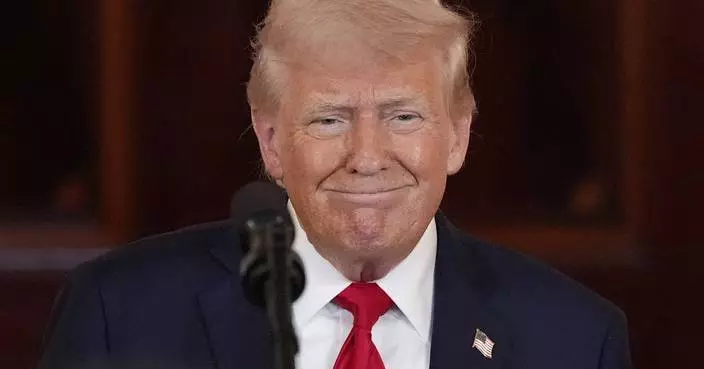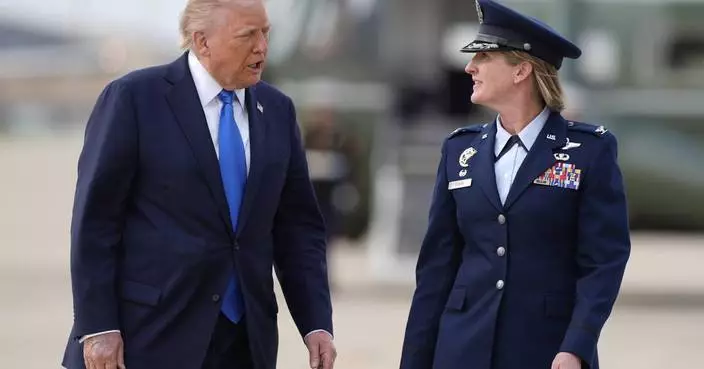WASHINGTON (AP) — Shaedon Sharpe has been one of the NBA's most gifted young dunk artists since he was selected seventh overall by the Portland Trail Blazers in the 2022 NBA draft. But he reached a new level on Wednesday night — possibly literally.
Sharpe's vicious one-handed slam over the unfortunately placed Justin Champagnie was immediately hailed as one of the best in the NBA this season. He called it the best of his career, and it was part of an all-around career night in Portland's 129-121 win over Washington Wizards.
“I just started like laughing, like, ‘Wow, man. Poor kid up under him,’" Portland coach Chauncey Billups said of the slam. “That was pretty incredible.”
The 21-year-old Sharpe led Portland with a career-high 36 points, shot 13 of 26 from the floor and sank 7 of 10 free throws, including four in a row down the stretch.
And his signature moment originated with an alert defensive play when he swiped Champagnie's pass beyond the 3-point arc. Sharpe then took one dribble into the paint and launched so high into the air that even his teammates were in disbelief.
“I don't know where he got it from,” Blazers forward Deni Avdija said. “I asked him on the bench, 'If I'm going to work as hard as I can, will I be able to jump like you?' I don't know, it's just genes.”
Such was the force of his slam that Sharpe crashed briefly to the court after flushing the ball through the net.
“I seen the dude in the way," Sharpe explained, "so I just jumped and tried to dunk it. And it went in.”
In 33 minutes, Sharpe also had eight rebounds — one shy of another career high — and five assists.
“His offense was incredible,” Billups said. “I mean it really was. On all three levels he was incredible the entire time. I thought the defense was high-level as well. I really did. And his rebounding, he got some really, really big rebounds for us.”
AP NBA: https://apnews.com/hub/nba
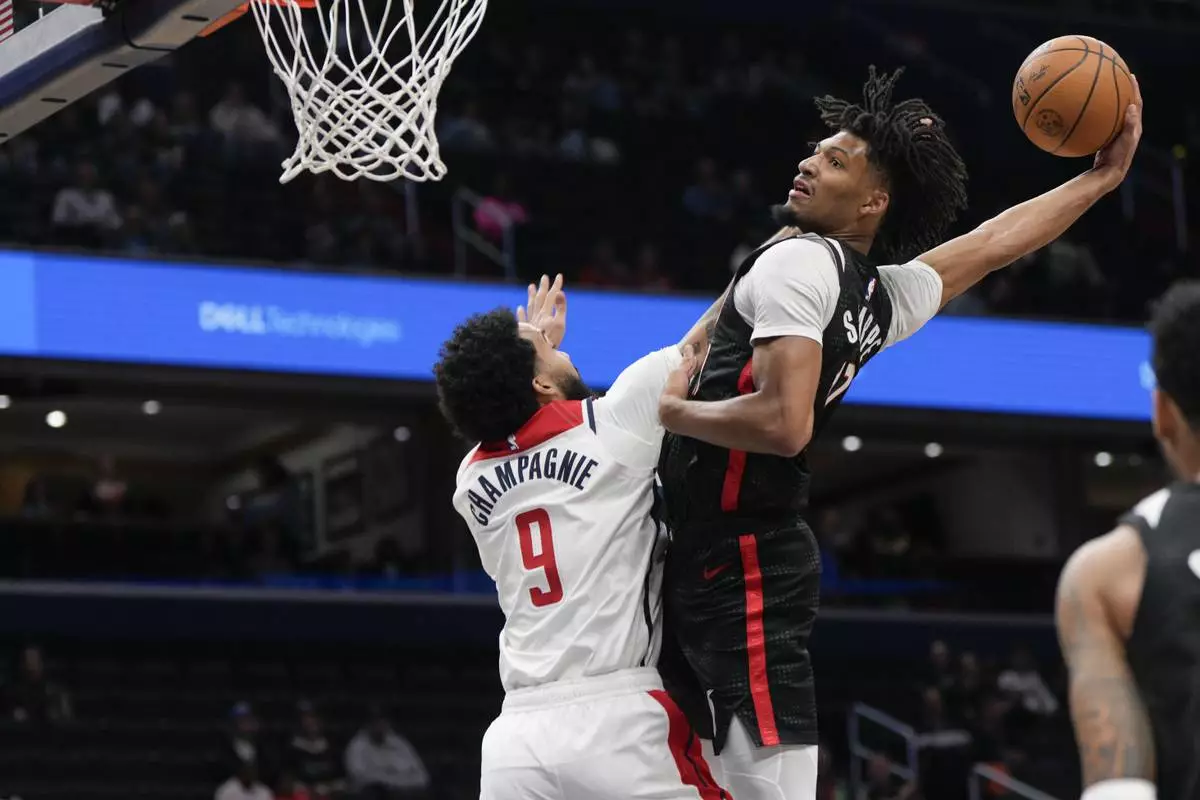
Portland Trail Blazers guard Shaedon Sharpe (17) dunks against Washington Wizards forward Justin Champagnie (9) during the first half of an NBA basketball game, Wednesday, Feb. 26, 2025, in Washington. (AP Photo/Jess Rapfogel)
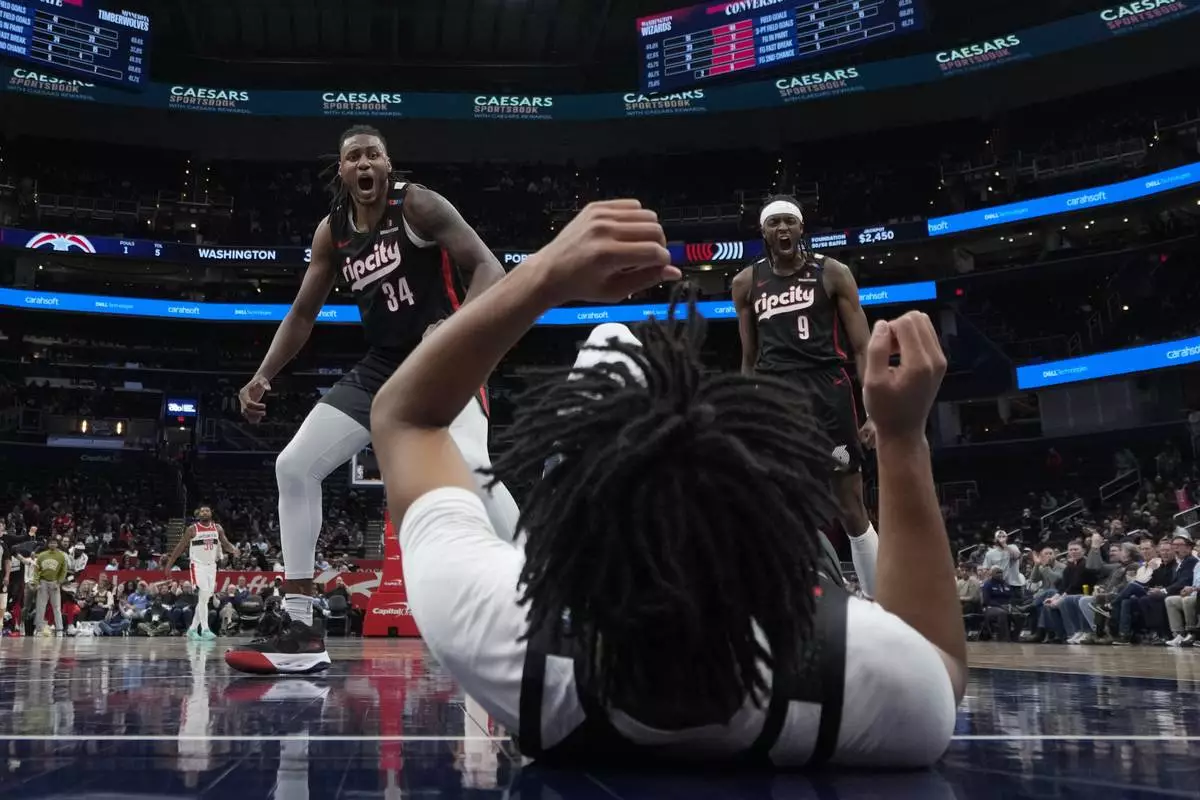
Portland Trail Blazers forwards Jabari Walker (34) and PJerami Grant (9) react after guard Shaedon Sharpe, center, dunks against the Washington Wizards during the second half of an NBA basketball game, Wednesday, Feb. 26, 2025, in Washington. (AP Photo/Jess Rapfogel)
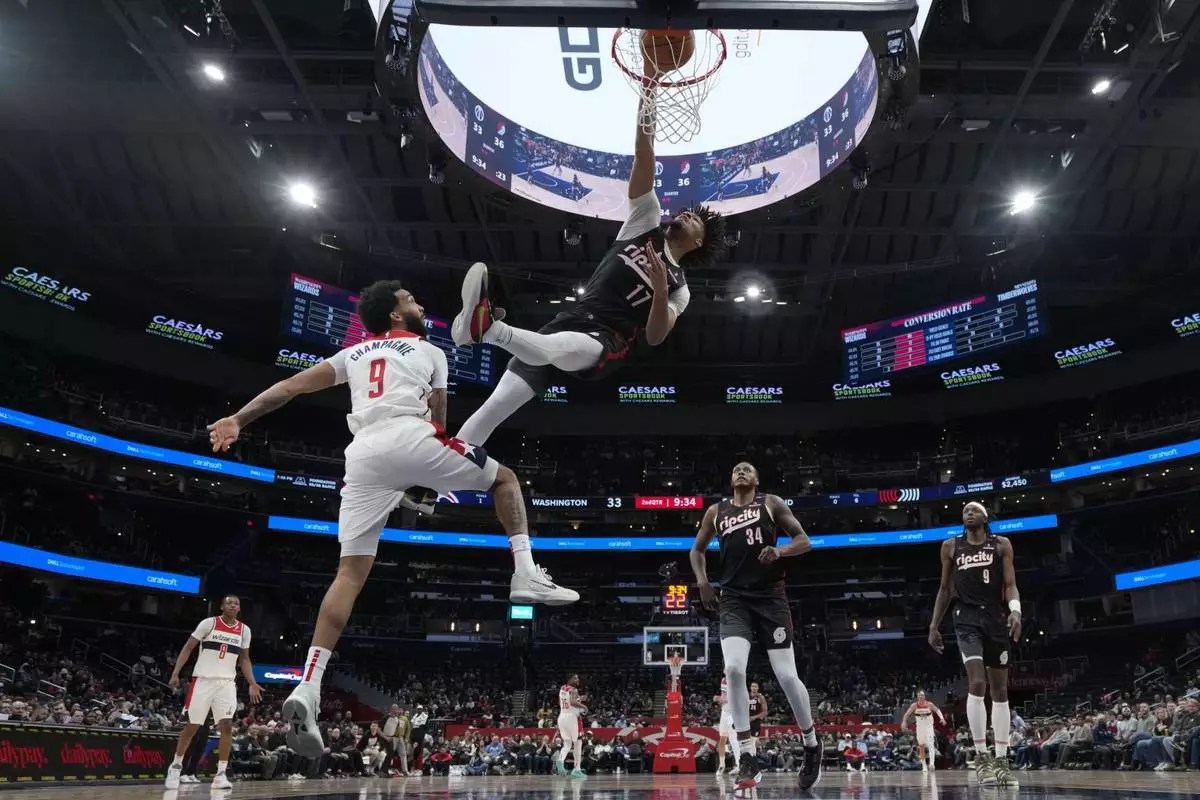
Portland Trail Blazers guard Shaedon Sharpe (17) dunks against Washington Wizards forward Justin Champagnie (9) during the first half of an NBA basketball game, Wednesday, Feb. 26, 2025, in Washington. (AP Photo/Jess Rapfogel)
Apple CEO Tim Cook said Thursday that the majority of iPhones sold in the U.S. in the current fiscal quarter will be sourced from India, while iPads and other devices will come from Vietnam as the company works to avoid the impact of President Trump's tariffs on its business.
Apple's earnings for the first three months of the year topped Wall Street's expectations thanks to high demand for its iPhones, and the company said tariffs had a limited effect on the fiscal second quarter's results.
Cook added that for the current quarter, assuming things don't change, Apple expects to see $900 million added to its costs as a result of the tariffs, but Cook said the company remains “confident” in this business.
The Cupertino, California-based company earned $24.78 billion, or $1.65 per share, in the first three months of the year, up 4.8% from $23.64 billion, or $1.53 per share, in the same period a year earlier.
Revenue rose 5.1% to $95.36 billion from $90.75 billion.
Analysts, on average, were expecting earnings of $1.62 per share on revenue of $94.19 billion, according to a poll by FactSet.
The numbers for the January-March period provide a snapshot of how Apple was faring before President Trump's unveiling of sweeping tariffs in April that rattled the financial markets amid fears a trade war would reignite inflation and shove the U.S. economy into a recession.
“While it is likely that some of the sales growth was driven by consumers accelerating purchases ahead of expected tariff increases, margins remained healthy on the other side of the balance sheet,” said Thomas Monteiro, an analyst at Investing.com. He added that the company “still has room for maneuver” regardless of the economic backdrop and will “likely not need to significantly deplete cash reserves to keep moving the needle.”
Apple’s reliance on Chinese factories to make its iPhones and other devices thrust the technology trendsetter into the crosshairs of Trump’s trade war. The exposure caused Apple’s stock price to plunge 23% shortly after the president announced the severity of the reciprocal tariffs, temporarily erasing $773 billion in shareholder wealth in the process.
Most of those losses have since been recovered after Trump temporarily exempted iPhones and other electronics from the reciprocal tariffs, but Apple’s stock remains down by nearly 5% since the April fusillade of tariffs.
Besides the trade war, Apple has been hurt by its inability to live up to its own hype surrounding artificial intelligence features on the iPhone 16 lineup that came out last fall.
The technology wasn’t ready when the iPhone 16 went on sale. Some AI features have rolled out in parts of the world as part of software updates, but Apple still hasn’t been able to live up to its original promise to make Siri smarter and more versatile. The missteps prompted Apple to pull advertising campaigns promoting AI breakthroughs on the iPhone, although the company still intends to release more features powered by the technology at some point.
Apple had been counting on its late entry into the AI craze to revive demand for the iPhone after last year’s sales dipped 2% from 2023’s levels. Apple said Wednesday that its phone sales climbed 1.9% to $46.84 billion for the first three months of the year. Wall Street had expected iPhone sales of $45.62 billion.
But the company continues to see its China business decline, with revenue from the Greater China region down 2.3% to $16 billion for the quarter. Other regions, including the Americas, Europe and the rest of Asia, saw sales increases.
When Trump initially indicated his 145% tariffs on Chinese-made goods would apply to the iPhone, U.S. consumers rushed to stores to buy new devices rather than risk prices spiking higher after the duties began driving up costs. But the flurry of panic buying won't show up until Apple reports its results for the April-June quarter this summer.
Trump's trade war has ramped up the pressure on Cook to work the same diplomatic sleight of hand that enabled the iPhone to avoid being stung by the China tariffs that the president imposed during his first administration.
Cook signaled his intention remain on good terms with Trump by arranging private meetings with him and personally donating $1 million to the president's second inauguration ceremony before sitting on the dais when Trump was sworn into office on January 20. Apple subsequently announced plans to invest $500 billion in the U.S. while hiring 20,000 workers during the next four years.
Trump's trade war also is prompting a push to Apple to shift all the production of the iPhones that it sells in the U.S. from China to India, where the company has been building up its supply chain for the past seven years, according to a recent story in the Financial Times. But the complicated logistics of making such a huge move likely couldn't be completed until next year, at the earliest, leaving Apple vulnerable to the vagaries of Trump's trade war.
Apple's stock fell $5.81, or 2.7%, to $207.51 in after-hours trading.
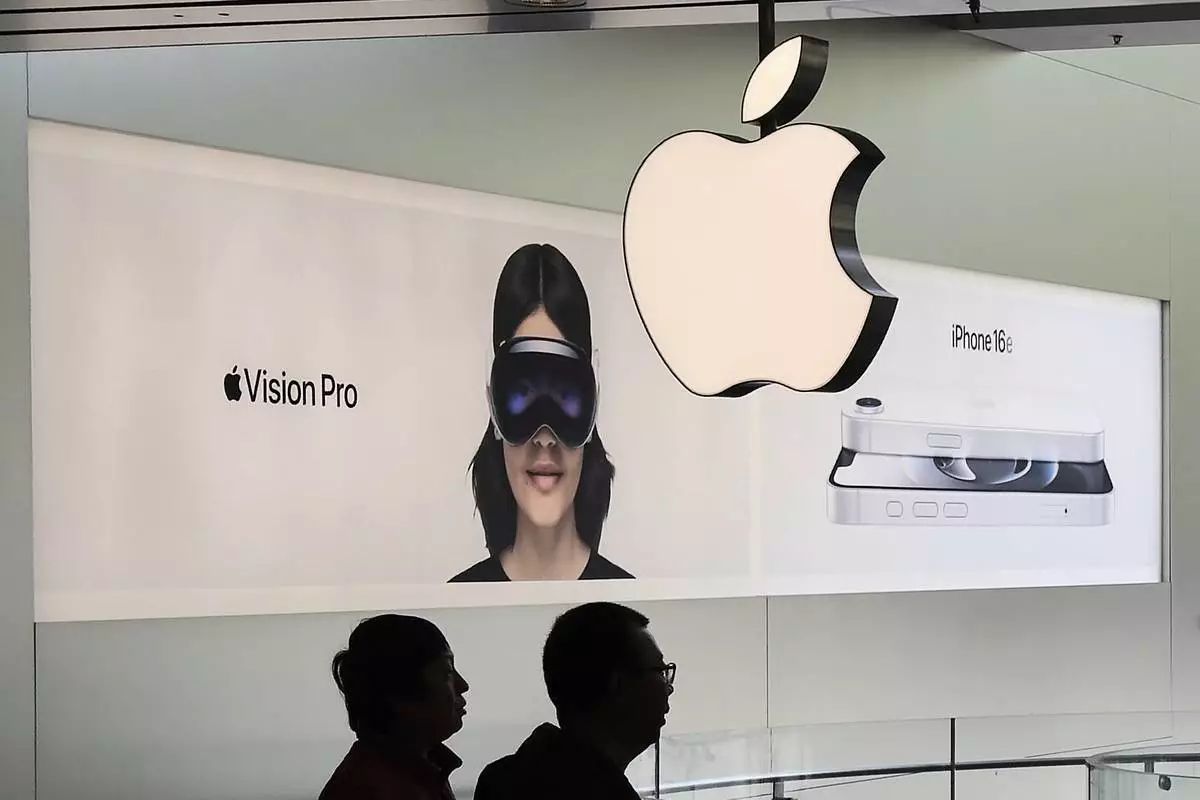
FILE - People visit an Apple Store, inside a shopping mall, in Beijing, Thursday, April 10, 2025. (AP Photo/Andy Wong, File)









